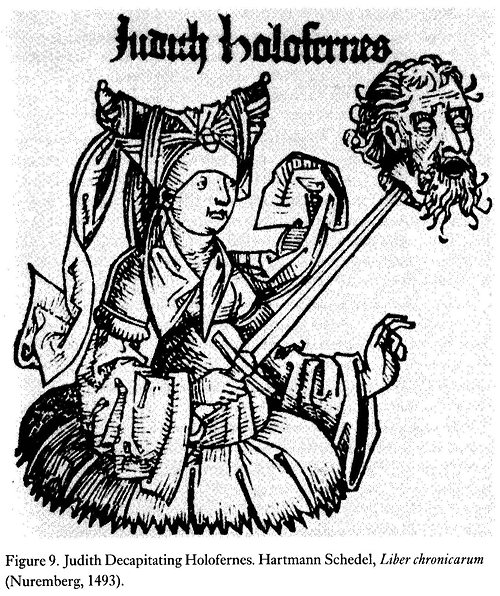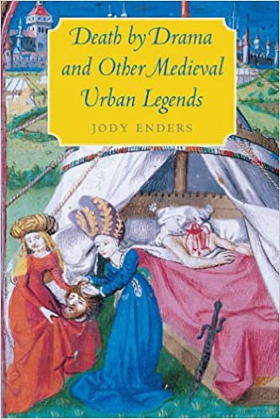Death by Drama
Paul posted last week about a real-life murder that occurred onstage during a play. This reminded me of another onstage death I once read about in Jody Enders' book Death By Drama and Other Medieval Urban Legends.
The death is said to have occurred in 1549, during a performance of the play Judith and Holofernes, which tells the Biblical (or Biblical apocrypha) story of Judith who cuts off the head of an Assyrian general, Holofernes. The producers of the play supposedly decided it would add a touch of realism if the actor playing Holofernes really was decapitated.
The details from Enders' book:

Enders has doubts this onstage execution ever really took place, but can't rule out the possibility altogether.
In the story's favor: Philip II really did go to Tournai in 1549; Jehan de Crehan was a real person; there really were plays performed in Philip's honor; and Tournai had a history of executing heretics, and of offering decapitation as a "kinder" alternative to more gruesome forms of execution.
The points against the story's veracity: not a single, extant contemporaneous source mentions this onstage decapitation. The first references to it only appear several hundred years later. And it stretches credulity to imagine that a condemned prisoner would obligingly play his part in the performance, even to the extent of pretending to be asleep before he was decapitated.

The death is said to have occurred in 1549, during a performance of the play Judith and Holofernes, which tells the Biblical (or Biblical apocrypha) story of Judith who cuts off the head of an Assyrian general, Holofernes. The producers of the play supposedly decided it would add a touch of realism if the actor playing Holofernes really was decapitated.
The details from Enders' book:
According to the legend, when Philip II made his triumphal entry into Tournai in 1549, he was greeted by a painstakingly realistic performance of the drama of Judith and Holofernes. Frederic Faber relates that producers Jean de Bury and Jean de Crehan had arranged a very special entertainment for the future monarch. A convicted heretic and murderer was to assume the role of Holofernes long enough to be decapitated during the play by another convicted felon. The latter, having been pardoned, would just as briefly assume the role of Judith, his executioner:
Jean de Bury and Jean de Crehan, duly charged with decorating the streets, had imagined rendering in its purest form the biblical exploit of Judith. Consequently, for filling the role of Holofernes, a criminal had been chosen who had been condemned to have his flesh torn with red-hot pincers. This poor fellow, guilty of several murders and ensconced in heresy, had preferred decapitation to the horrible torture to which he had been condemned, hoping, perhaps, that a young girl would have neither the force nor the courage to cut off his head. But the organizers, having had the same concern, had substituted for the real Judith a young man who had been condemned to banishment and to whom a pardon was promised if he played his role well.
The story goes that the two substitutions were accepted by the two unnamed men. Being an actor / executioner was apparently preferable to being banished, and death by decapitation during drama was preferable to being skinned alive (something that the Eel of Melun might himself have understood).
"Judith" had only one condition to meet: to provide acting so good that it wasn't acting at all. . .
The fantastic narrative next shows Philip arriving just as the axe is falling. As real blood supposedly begins to flow, it prompts applause in some, indignation in others, and curiosity in the prince, who remains implacable as the body of "Holofernes" goes through its last spasms:
In fact, as Philip approached the theater where the mystery play was being represented, the so-called Judith unsheathed a well-sharpened scimitar and, seizing the hair of Holofernes, who was pretending to be asleep, dealt him a single blow with so much skill and vigor that his head was separated from his body. At the [sight of] the streams of blood that spurted out from the neck of the victim, frenetic applause and cries of indignation rose up from amid the spectators. Only the young prince remained impassive, observing the convulsions of the decapitated man with curiosity and saying to his noble entourage: "nice blow".
Jean de Bury and Jean de Crehan, duly charged with decorating the streets, had imagined rendering in its purest form the biblical exploit of Judith. Consequently, for filling the role of Holofernes, a criminal had been chosen who had been condemned to have his flesh torn with red-hot pincers. This poor fellow, guilty of several murders and ensconced in heresy, had preferred decapitation to the horrible torture to which he had been condemned, hoping, perhaps, that a young girl would have neither the force nor the courage to cut off his head. But the organizers, having had the same concern, had substituted for the real Judith a young man who had been condemned to banishment and to whom a pardon was promised if he played his role well.
The story goes that the two substitutions were accepted by the two unnamed men. Being an actor / executioner was apparently preferable to being banished, and death by decapitation during drama was preferable to being skinned alive (something that the Eel of Melun might himself have understood).
"Judith" had only one condition to meet: to provide acting so good that it wasn't acting at all. . .
The fantastic narrative next shows Philip arriving just as the axe is falling. As real blood supposedly begins to flow, it prompts applause in some, indignation in others, and curiosity in the prince, who remains implacable as the body of "Holofernes" goes through its last spasms:
In fact, as Philip approached the theater where the mystery play was being represented, the so-called Judith unsheathed a well-sharpened scimitar and, seizing the hair of Holofernes, who was pretending to be asleep, dealt him a single blow with so much skill and vigor that his head was separated from his body. At the [sight of] the streams of blood that spurted out from the neck of the victim, frenetic applause and cries of indignation rose up from amid the spectators. Only the young prince remained impassive, observing the convulsions of the decapitated man with curiosity and saying to his noble entourage: "nice blow".

Enders has doubts this onstage execution ever really took place, but can't rule out the possibility altogether.
In the story's favor: Philip II really did go to Tournai in 1549; Jehan de Crehan was a real person; there really were plays performed in Philip's honor; and Tournai had a history of executing heretics, and of offering decapitation as a "kinder" alternative to more gruesome forms of execution.
The points against the story's veracity: not a single, extant contemporaneous source mentions this onstage decapitation. The first references to it only appear several hundred years later. And it stretches credulity to imagine that a condemned prisoner would obligingly play his part in the performance, even to the extent of pretending to be asleep before he was decapitated.

Comments
I mentally file things like this as "Could Have Happened" and avoid discussions as to whether it did actually occur.
The fact that he appeared asleep lends, for me, some credulity. For him to be unrestrained and boldly martyr himself for the Prince's pleasure seems, without further background, a bit far-fetched. It is much more reasonable, for me, that he was given the choice: A) skinned alive in front of a joyous crowd, or B) "Do a bit of acting and then drink this physician's potion. You'll slip gently into the arms of Morpheus and spend eternity in blissful dream." I think this is what is commonly called a: No-Brainer.
Or, instead of drinking it, maybe breathing in the fumes from a sponge. In "Chirurgia magna," Guy de Chauliac (physician to the popes in Avignon) described a soporific sponge soaked in a mixture of opium, nightshade, henbane, mandrake, and hemlock, along with vinegar, camphor, and a few oddments. In the 16th Century, Ambroise Paré used a similar mixture when performing surgeries. Modern researchers say it wouldn't be as effective or safe as modern anesthesia, but it would have worked. (You have no idea how long I've waited to use this bit of world-building miscellany!)
To the Yes Or No question of whether it really happened, my answer is a very firm "Eh, maybe, sorta."
The fact that he appeared asleep lends, for me, some credulity. For him to be unrestrained and boldly martyr himself for the Prince's pleasure seems, without further background, a bit far-fetched. It is much more reasonable, for me, that he was given the choice: A) skinned alive in front of a joyous crowd, or B) "Do a bit of acting and then drink this physician's potion. You'll slip gently into the arms of Morpheus and spend eternity in blissful dream." I think this is what is commonly called a: No-Brainer.
Or, instead of drinking it, maybe breathing in the fumes from a sponge. In "Chirurgia magna," Guy de Chauliac (physician to the popes in Avignon) described a soporific sponge soaked in a mixture of opium, nightshade, henbane, mandrake, and hemlock, along with vinegar, camphor, and a few oddments. In the 16th Century, Ambroise Paré used a similar mixture when performing surgeries. Modern researchers say it wouldn't be as effective or safe as modern anesthesia, but it would have worked. (You have no idea how long I've waited to use this bit of world-building miscellany!)
To the Yes Or No question of whether it really happened, my answer is a very firm "Eh, maybe, sorta."
Posted by Phideaux on 03/18/22 at 01:10 PM
It always makes me laugh to think about medieval playwright who had to cast men to play damsels and fake-flirt with other male actors in front of homophobic members of the clergy. The movie "Shakespeare in Love" portrays it well.
Posted by Yudith on 03/19/22 at 05:07 PM
Yudith: sorry to say you have been fooled on two occasions. Both of those are very Victorian, and not mediæval at all.
Posted by Richard Bos on 03/19/22 at 05:17 PM
@Yudith -- Whether there were actresses depended on time and area. Ancient Greeks had none; Ancient Romans had a few; other areas and later times had none, a few, or many, depending on who was in control. In England: Elizabethan, none; Jacobean, none; Restoration, many; Victorian, none; etc..
Generally, playwrights ignored the issue and simply wrote female characters as females. It was if/when they put on their director's hat that it became a problem for them. There were women playwrights in Medieval times, but I've never heard of a female director then.
I've always held that you can't properly stage a Shakespearian play with women in the cast, but that's just to be perverse. The roles were obviously written for women.
Generally, playwrights ignored the issue and simply wrote female characters as females. It was if/when they put on their director's hat that it became a problem for them. There were women playwrights in Medieval times, but I've never heard of a female director then.
I've always held that you can't properly stage a Shakespearian play with women in the cast, but that's just to be perverse. The roles were obviously written for women.
Posted by Phideaux on 03/19/22 at 08:41 PM
Commenting is not available in this channel entry.

Category: Death | Theater and Stage | Fables, Myths, Urban Legends, Rumors, Water-Cooler Lore | Sixteenth Century